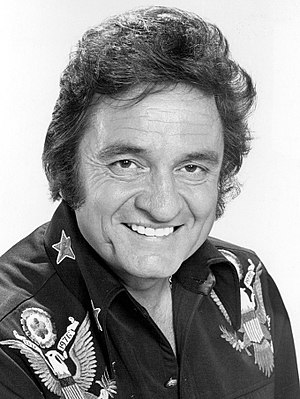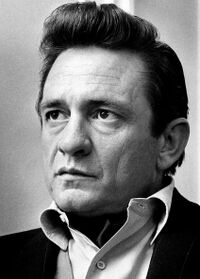Johnny Cash: Difference between revisions
No edit summary |
No edit summary |
||
| (2 intermediate revisions by the same user not shown) | |||
| Line 4: | Line 4: | ||
Morrissey has been pictured wearing a Johnny Cash badge on stage. | Morrissey has been pictured wearing a Johnny Cash badge on stage. | ||
<gallery> | <gallery> | ||
File:Cash badge.jpg| | File:Cash badge.jpg|Wembley Arena on March 14, 2020 | ||
File:NME Cash finger.jpg|[https://www.nme.com/news/music/johnny-cash-19-1292708 (source)] | File:NME Cash finger.jpg|Cash at San Quentin, 1969 [https://www.nme.com/news/music/johnny-cash-19-1292708 (source)] | ||
</gallery> | </gallery> | ||
{{Page | {{Page | ||
Latest revision as of 04:06, 27 October 2024
Relevance
Morrissey has been pictured wearing a Johnny Cash badge on stage.
Cash at San Quentin, 1969 (source)
Discogs Information
Profile
Johnny Cash was an American singer-songwriter, actor, musician and author, born February 26, 1932 in Kingsland, Arkansas, USA as J.R. Cash; he died September 12, 2003 in Baptist Hospital, Nashville, Tennessee, USA. Cash was a hugely influential country singer. His all-black stage wardrobe earned him the nickname "The Man in Black".
He was married to country singer June Carter. Tommy Cash is his younger brother. Joanne Cash is his younger sister. Roy Cash Sr. is his older brother. Roy Cash Jr. is his nephew. Singer-songwriter Rosanne Cash is his daughter, from his first marriage with Vivian Liberto. Stepfather of singer-songwriter Carlene Carter (daughter of June Carter and her first husband Carl Smith (3)).
Johnny Cash was inducted into the Nashville Songwriters Hall of Fame in 1977, the Country Music Hall of Fame in 1980, the Rock And Roll Hall of Fame in 1992 (performer), and the Gospel Music Hall of Fame in 2010.
External Links
- https://www.discogs.com/artist/135946-Johnny-Cash
- https://www.johnnycash.com/
- https://www.johnnycashradio.com/
- https://soundcloud.com/johnnycash
- https://myspace.com/johnnycash
- https://en.wikipedia.org/wiki/Johnny_Cash
- https://www.imdb.com/name/nm0143599/
- https://www.youtube.com/channel/UCLwdOhL6TKbmjRtZ8wIr-Bg
- https://www.instagram.com/johnnycash/?hl=en
- https://www.facebook.com/johnnycash/
- https://open.spotify.com/artist/6kACVPfCOnqzgfEF5ryl0x?si=jLMTbbydQ8eWiQR8Yepa3Q&nd=1
Wikipedia Information
 |
John R. Cash (born J. R. Cash; February 26, 1932 – September 12, 2003) was an American singer-songwriter. Most of Cash's music contains themes of sorrow, moral tribulation, and redemption, especially songs from the later stages of his career. He was known for his deep, calm, bass-baritone voice, the distinctive sound of his backing band, the Tennessee Three, that was characterized by its train-like chugging guitar rhythms, a rebelliousness coupled with an increasingly somber and humble demeanor, and his free prison concerts. Cash wore a trademark all-black stage wardrobe, which earned him the nickname "Man in Black". Born to poor cotton farmers in Kingsland, Arkansas, Cash grew up on gospel music and played on a local radio station in high school. He served four years in the Air Force, much of it in West Germany. After his return to the United States, he rose to fame during the mid-1950s in the burgeoning rockabilly scene in Memphis, Tennessee. He traditionally began his concerts by introducing himself with "Hello, I'm Johnny Cash". He began to follow that by "Folsom Prison Blues", one of his signature songs. His other signature songs include "I Walk the Line", "Ring of Fire", "Get Rhythm", and "Man in Black". He also recorded humorous numbers like "One Piece at a Time" and "A Boy Named Sue", a duet with his future wife June called "Jackson" (followed by many further duets after they married), and railroad songs such as "Hey, Porter", "Orange Blossom Special", and "Rock Island Line". During the last stage of his career, he covered songs by contemporary rock artists; among his most notable covers were "Hurt" by Nine Inch Nails, "Rusty Cage" by Soundgarden, and "Personal Jesus" by Depeche Mode. Cash is one of the best-selling music artists of all time, having sold more than 90 million records worldwide. His genre-spanning music embraced country, rock and roll, rockabilly, blues, folk, and gospel sounds. This crossover appeal earned him the rare honor of being inducted into the Country Music, Rock and Roll, and Gospel Music Halls of Fame.


